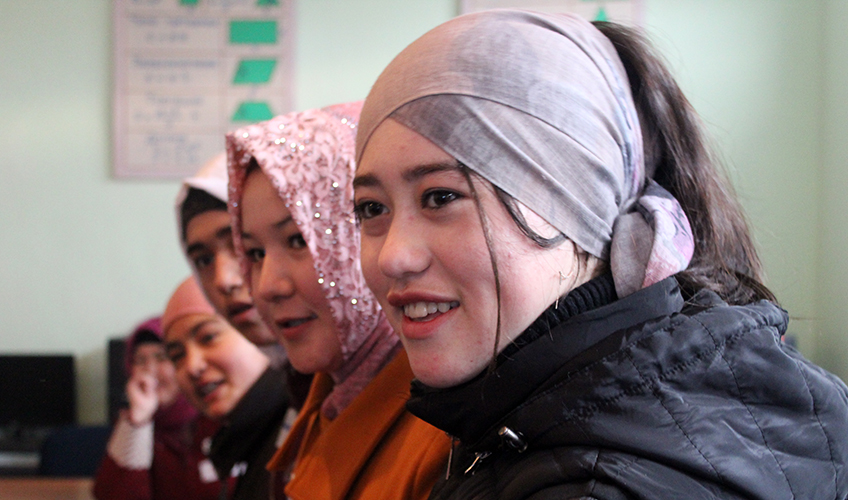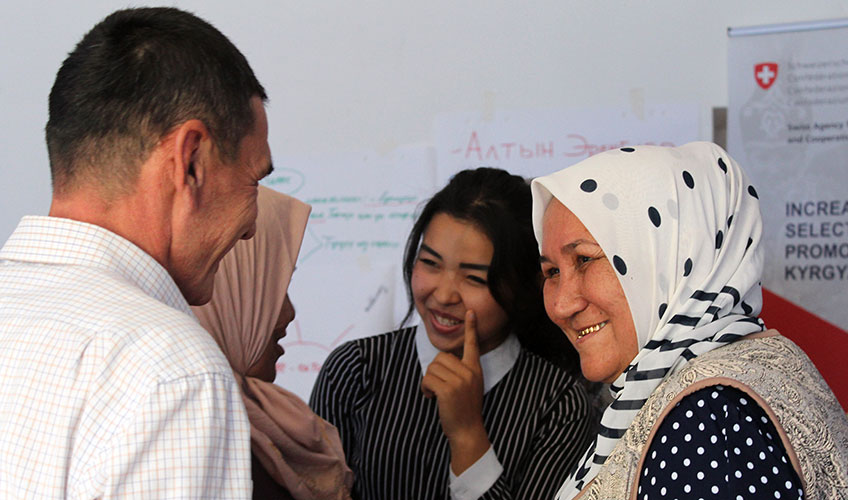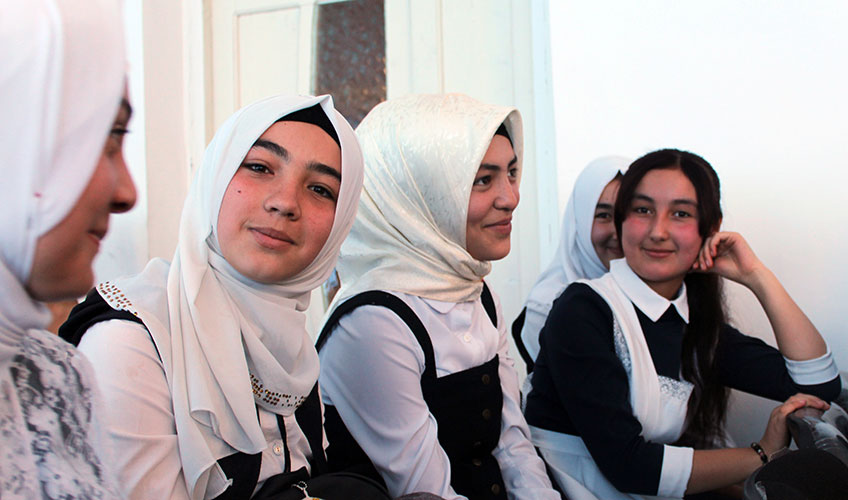Against early marriage in Gulistan
A preliminary study conducted within the ‘Increasing tolerance in selected municipalities to promote social cohesion in Kyrgyzstan’ project found that society in Gulistan is deeply religious, observes Sharia law, but significantly lacks knowledge about secularism and the foundations of the Constitution of the Kyrgyz Republic.

The level of public confidence in religious leaders is higher than in local self-government (LSG) bodies. Religious leaders are in close contact with local authorities – religion is used as a method of rapprochement and reconciliation. If the local government is not able to resolve the conflict, it is solved by imams.
Religious organisations cooperate with local authorities on issues of improvement, charity and educational work with young people and children, and conduct joint religious ceremonies including a weekly Friday prayer with the participation of the head of aiyl okmotu (village). There are no women deputies in Gulistan, as there is no community support for women’s participation in politics. Gulistan’s society sees the main role of women as raising children in the faith of Islam and observing Sharia law.
A woman in a focus group in the village of Gulistan shares with us;
I live by Sharia law and teach my girls, too. Girls don’t need education, they are created for their future husbands, they should become good wives for them and should not contradict them in anything … They should know the Quran and raise real Muslims.
The International Alert Kyrgyzstan project creates conditions for active civic participation and cooperation between local authorities and religious figures within the framework of the Constitution and the law “on freedom of religion and religious organisations.”
Experts, together with the State Commission for Religious Affairs of the Kyrgyz Republic, conducted trainings for civil society activists, religious leaders and representatives of LSG bodies of Gulistan on mediation, conflict sensitivity, social tolerance and legal aspects of relations between LSG bodies, religious organisations and civil society.
“Imagine, I have never read the Constitution and thought, did we really need it? At the training, I realised its importance. When I began to read it for the first time, I realised that Kyrgyzstan is not a Muslim country, that we not only have rights, but also obligations, that there are laws. I also found out that imams will be held accountable for conducting nikes (religious marriage ceremony) involving underage children,” said one training participant.

As part of this project an initiative group was created consisting of local activists, including women, representatives of local governments and religious figures. They developed their own project, ‘Prevention of early marriages,’ aiming to reduce the number of early marriages.
According to this initiative group, married girls in grades 9-11 have to discontinue school, and as a result, they lose secondary, higher education and access to a profession. Underage girls are often subjected to domestic violence and psychological abuse, and in the case of divorce, they are left without means of support.
“Early marriages are one of the biggest problems in Gulistan. The number of divorces has increased. Out of 15-20 marriages, half of them have ended in divorce and the children have become orphans or grow up in single-parent families. The most terrible consequence is a suicide case of a young girl who was forced to marry against her will. We still have a tradition, in Gulistan, of marrying girls as early as possible because of the fear that they will become “old maids”. Since imams of our village have a great influence, we asked them to talk to parents about the dangers of early marriage. Now we see a slight decline in the number of early marriages,” the leader of the initiative group, Akhmadjon Tashtemirov, tells me.
The initiative group planned and held an information meeting at the local mosque for imams and local residents, where the deputy head of aiyl okmotu spoke about the dangers of early marriages. Later, representatives of the State Commission for Religious Affairs and the Ministry of Internal Affairs conducted awareness-raising activities on the consequences and risks of early marriages for employees of aiyl okmotu, local residents and religious figures in Gulistan.

In order to raise girls’ awareness of their rights, seminars on women’s rights and the consequences of early marriage were held for students in grades 9-11. As it turned out, the students did not know about their rights, which are guaranteed by the Constitution. They were not aware of the prohibition of having a nikes/nikah without an official registration of marriage, and that parents do not have the right to marry underage girls. Later, trainings were held for high school girls with a psychologist, where the girls gave mini performances about the dangers of early marriage. In their opinion, the main dangers around arranged marriages is the labour exploitation of the daughter-in-law and domestic violence by the husband’s family towards her. In this case, it would be considered a shame for the family if she returns to her parents. The girls also said they would like to become doctors or teachers in the future, but if they were married early, then they could not dream of a profession.
“In the Nookat district, in Uzbek language schools parents are not concerned about their daughters’ education at all. Even if the girl is a good student, she will be married off after the 9th grade, despite not being ready for married life at all.” The school principal at Chili-Sai, Tillabayeva Mashraphan, goes on to tell us:
Now, thanks to the project, parents have at least started to come to school and talk to teachers about their girls, and are interested in their success. Parents took no interest in their daughters before.
The initiative group plans to conduct intensive educational work with students of all schools in Gulistan, their parents and young people, involving local authorities and civil activists.
About the project
The project ‘Increasing tolerance in selected municipalities to promote social cohesion in Kyrgyzstan’ supported civic participation and peaceful dialogue between communities, religious groups and local authorities.
Focusing on six municipalities in Chui, Issyk-Kul, Naryn and Osh oblasts (regions), we ran focus groups, organised public debates and discussions on the role of religion in a secular state and provided training for religious leaders in mediation, conflict analysis and resolution, gender issues, and the social and legal role of religion and religious organisations in the country. We also piloted a scheme to give small grants to communities.
This project ran from March 2019 to March 2020, working with the following local partners: Development Policy Institute, Muftiyat, State Agency for Local Self-governance and Inter-ethnic Relations, Kyrgyzstan and State Agency for Religious Affairs, Kyrgyzstan.




